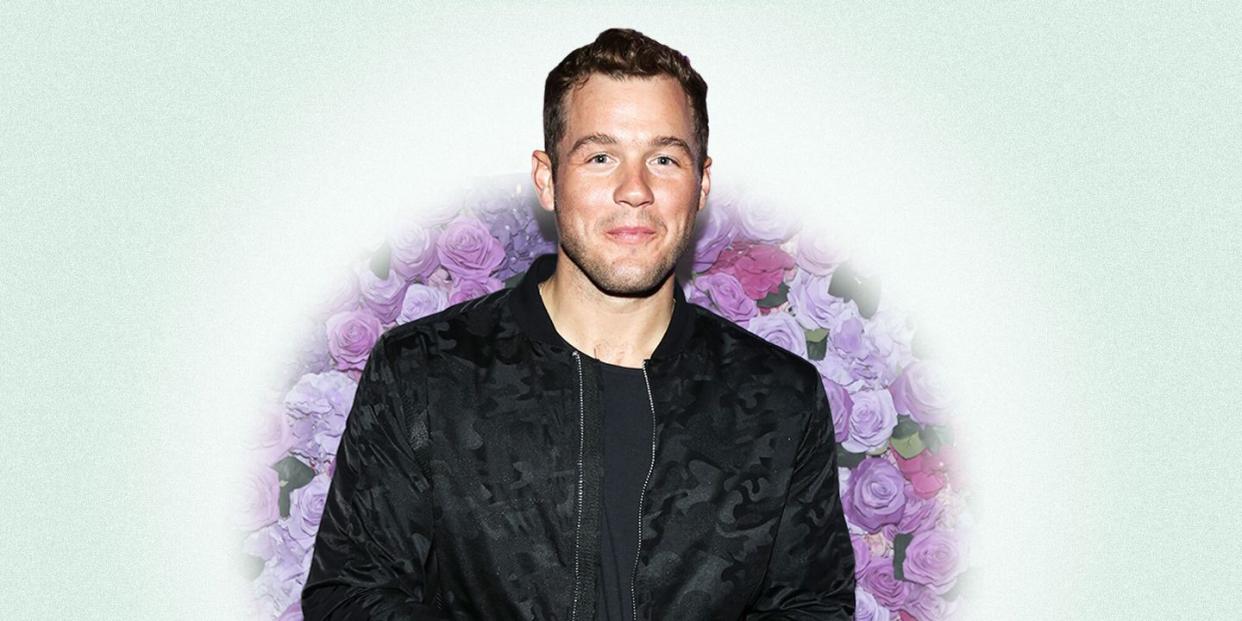Colton Underwood and the Power of Complicated Coming Out Stories

When Good Morning America announced that Colton Underwood of The Bachelor fame was going to sit down with Robin Roberts on Wednesday morning, I knew in my gut what was coming. In the promos, he had the face—this face when you’re existing in the crossroads of desperation and optimism. That is a beautiful, awful place to be because it means that you’ve convinced yourself that there is more good ahead than bad. It also means that you’ve reckoned with self-hate and bad choices and outside forces that have brought you to that moment. It’s the face of being in the muck of the middle, worried that with the pull of one thread, the whole of you might unravel.
Sitting down with Roberts, Underwood gets to the point pretty quickly in his eight-minute interview. He is, in fact, gay, despite placing fourth on a season of The Bachelorette, then leading his own season of The Bachelor the following year. Dubbed “the virgin Bachelor,” his whole shtick was that he had never slept with anyone, despite having dated women in the past. His season, plagued with speculation about his sexuality, ended with a relationship with contestant Cassie Randolph.
JUST IN: Former “Bachelor” star @Colton Underwood speaks his truth and comes out to @robinroberts: “I’m gay. And I came to terms with that earlier this year and have been processing it… I’m the happiest and healthiest I’ve ever been in my life.” https://t.co/PoYJUAPBpA pic.twitter.com/isP7SptUu7
— Good Morning America (@GMA) April 14, 2021
That’s when it all got really complicated. The two dated for about a year and a half, with Underwood saying as recently as last March that his time on The Bachelor confirmed to him that he wasn’t gay, or as he says in an interview, “the other way.” He doubles down on it in his memoir. Then the two broke up in spring of 2020. What started as an amicable split devolved, and by September, Randolph filed for a restraining order, alleging that Underwood had been sending threatening texts and had gone so far as to put a tracker on her car. In November, Randolph dropped the restraining order, with the two coming to a solution outside of court. And now, five months later, the coming out.
The timeline is not what anyone hopes for. And if the allegations are true, the behavior is also not acceptable. And listen, there’s no good that comes from speculation (look online at all the people delighting in the excitement of sending “I told you so” tweets), but it’s worth looking at the whole of the picture. While discussing being cast as the Bachelor, Underwood told Roberts he thanked God for the call from producers, adding to the prayer, “Finally, you’re letting me be straight.”
It’s a familiar, desperate cry to some unseeable entity to fix what everyone in your life has told you is broken. You take opportunities and make choices to cover up your tracks, whether they’re good or not. Sometimes, you star on two seasons of one of the most popular dating reality shows in America. That’s, clearly, the extreme. When Roberts asked him about the women he might have hurt via The Bachelor, he says, “I thought a lot about this, too—do I regret being the Bachelor, and do I regret handling it the way I did? I do… I just wish I hadn’t dragged people into the mess of figuring out who I was.”

To a lot of fans, that reflection isn’t enough. Some say he simply should have known better. Others online say that Underwood is a stalker and abuser and that Randolph should be the one with the Good Morning America exclusive, despite the two settling their issues in a “private agreement,” with Randolph requesting the restraining order be removed. We, as a public jury, have come to expect our own version of justice for other people’s narratives, sometimes with little care to what the involved parties want. We demand a front seat to other people’s lives but balk when they don’t handle the complexities the way we see fit. For this story to mean anything at all, it requires that we listen to the people involved instead of making value assessments.
The thing about the middle—the place with the loose threads—is that the person stuck there believes that they can handle it. The middle is the con: the belief that you can convince those around you, but most importantly yourself, that you can fight against the queerness that defines so much of who you are. It eats at you because this pursuit of a perceived normalcy is not sustainable, and you feel so desperate that you do anything to protect this fleeting sense of someone you never were. I don't think people understand how much you can come to hate yourself in the middle. How you have this one thing that can make your own family hate you and how that can push you to do shitty things to others. The key element when building a whole existence based on a lie is the belief that you can pull it off and preserve something that was never there.

Again, that’s not excusing bad behavior. In the case of Underwood’s journey, there’s an extremity that is alarming. But in the wake of his coming out and the private details of Randolph dropping the restraining order against him, what we have is a different kind of coming out story: one that makes neither a hero nor a villain of its main character. What we have is the nuance of it all—how a man, who once considered that being dead was a better alternative to being gay, came out despite making a lot of errors along the way. A story about how the tenets of masculinity and religion can cloud judgment to the point that you hurt others around you. The irony is, in pursuit of making sure one thread doesn’t get pulled, you unravel everything around it.
For Underwood, so much of his story was public information. We have select details to go off of: TMZ-released court documents, podcast interviews, GMA exclusives. We don’t know the parameters of Randolph and Underwood's private agreement, or any of the rest of his experience for that matter. I don’t think we deserve to know either. It’s not our business. What we do have is the story in front of us, and I think it’s worth our attention. In an avalanche of queer stories that either end in unabashed support or violent dismissal, we have an opportunity to reflect on one, albeit intense, case that exists in neither space, which is where I believe most of us live.

Get 87 Years of Award-Winning Journalism, Every Day
Join Esquire Select
The middle is a familiar place for so many queer people. You live in fear of being exposed. I’ve felt it my whole life. Every queer person has made a mess of the middle, to some extent. I think it's because we don't know what to do. Too many of these stories we know end in extremes. Jake Gyllenhaal being bludgeoned in Brokeback Mountain or Jennifer Garner telling her teenaged son he can exhale in Love, Simon. We know the latter is rare, so we fear the former. And we use that to justify the means.
In college, a friend, one of five who knew I was gay, announced it to a campus party when I wasn’t there. I was convinced the news would make it from my small school, back home to my parents 30 minutes away, so I went back into the closet. Dated women. Lied to everyone in my life. The trauma response is to fix the situation by any means. We do what we feel needs to be done, even when it's not right. Even when it's messy. And even when we know later that an apology doesn't undo the bad.
We, inherently, do not like the complexity. But worst of all, because we don't like talking about the middle, it leads us to believe we're the only ones who exist there. We convince ourselves that no one has ever felt that hurt or made mistakes or hurt anyone in pursuit of protecting themselves. By addressing the middle, we can start to eliminate it.
You Might Also Like


